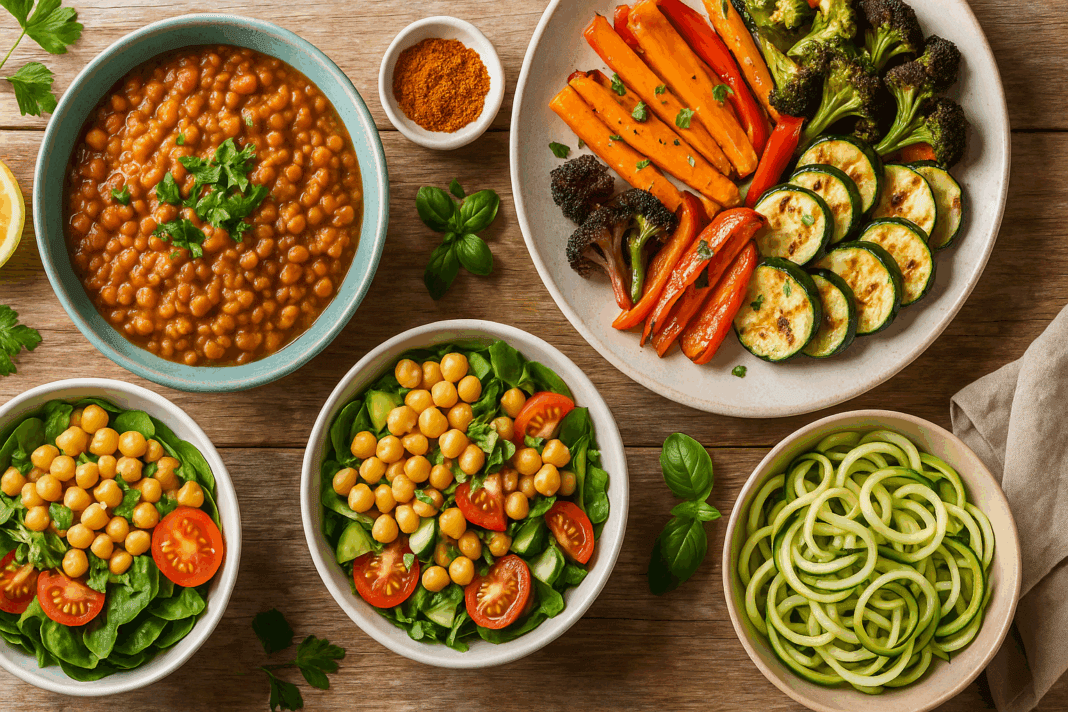In recent years, more people have been shifting toward plant-based diets, not only for ethical or environmental reasons but also to support healthier lifestyles. Among the most compelling motivations is weight management, particularly through the strategic use of vegetarian meals. These dishes are not just wholesome and nutrient-dense but also low in empty calories, making them ideal for sustainable weight loss. In this article, we’ll explore ten expert-backed vegetarian meals for weight loss, providing insight into how they work and why they support long-term health goals. Each recipe is carefully selected to reflect the principles of mindful eating and balanced nutrition while integrating seamlessly into your everyday routine. This exploration also highlights the practical power of vegetarian recipes for weight loss and their role in promoting metabolic efficiency, satiety, and overall well-being.
You may also like: Healthy Plant-Based Dinners Made Easy: Best Whole Food Plant-Based Recipes for Beginners and Beyond
Understanding the Science Behind Vegetarian Weight Loss Meals
To fully appreciate the effectiveness of vegetarian meals for weight loss, it’s important to understand the science underpinning plant-based nutrition. Unlike calorie-restrictive diets that often result in nutrient deficiencies and rebound weight gain, a weight loss vegetarian diet focuses on nourishment and metabolic support. Fiber, found abundantly in vegetables, legumes, whole grains, and fruits, plays a pivotal role in promoting satiety. It slows gastric emptying and helps stabilize blood sugar levels, reducing cravings and overeating. Moreover, vegetarian diets are typically lower in saturated fats and higher in phytonutrients and antioxidants, contributing to improved cardiovascular health and better regulation of appetite-related hormones.
Scientific studies have consistently demonstrated the benefits of plant-based eating patterns in lowering body mass index (BMI), reducing fat mass, and improving metabolic markers such as insulin sensitivity and lipid profiles. For example, a study published in the Journal of General Internal Medicine found that individuals who followed vegetarian diets lost more weight than those on non-vegetarian diets over an 18-week period. This was especially true when meals emphasized whole, minimally processed foods. These findings affirm that healthy veggie meals to lose weight are not only effective but also rooted in scientific evidence.
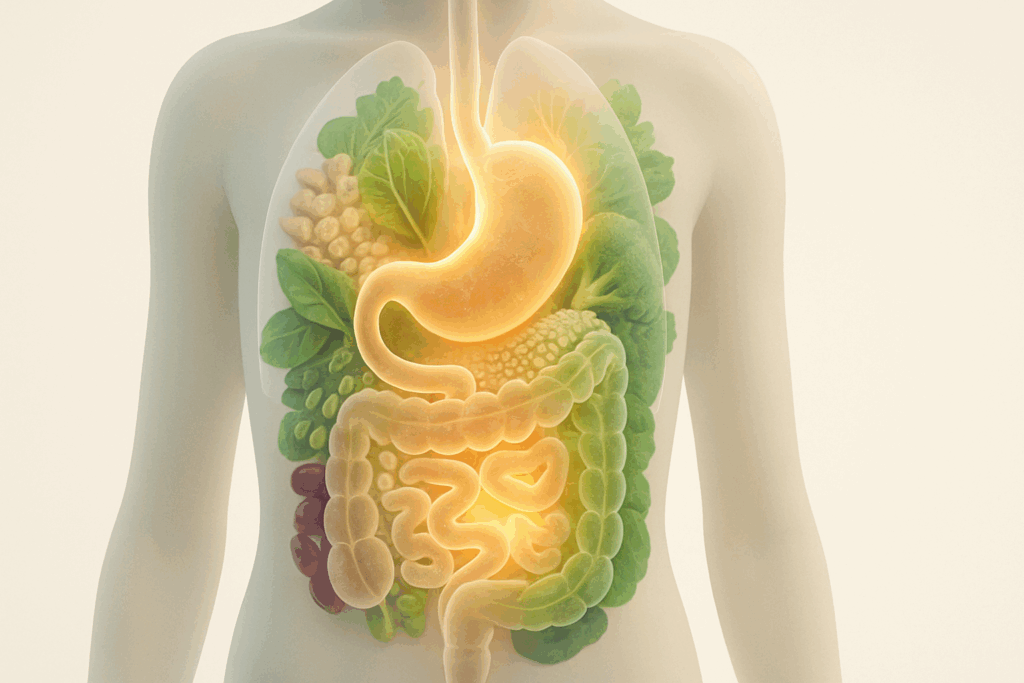
Building Blocks of a Successful Weight Loss Vegetarian Diet
Effective vegetarian weight loss plans share several key components. First, they prioritize nutrient density over calorie density. This means focusing on foods that provide a high concentration of essential nutrients per calorie. Leafy greens, cruciferous vegetables, legumes, and whole grains all fit this criterion, making them staples in weight loss vegetarian diet recipes. Second, they incorporate adequate protein sources to support muscle maintenance and repair. Although vegetarian diets exclude meat, they can still provide ample protein through beans, lentils, tofu, tempeh, quinoa, and dairy or egg products for those who follow a lacto-ovo-vegetarian pattern.
Third, successful meal plans are diverse and enjoyable. One of the greatest barriers to long-term adherence is dietary monotony. Including a variety of textures, flavors, and cuisines keeps meals exciting and satisfying. Finally, portion control and meal timing play a supportive role in managing hunger and energy intake. When meals are balanced and strategically planned, it becomes easier to honor hunger cues and avoid mindless snacking. In this context, incorporating vegetarian recipes for weight loss becomes a dynamic and flavorful approach to health, rather than a restrictive regimen.
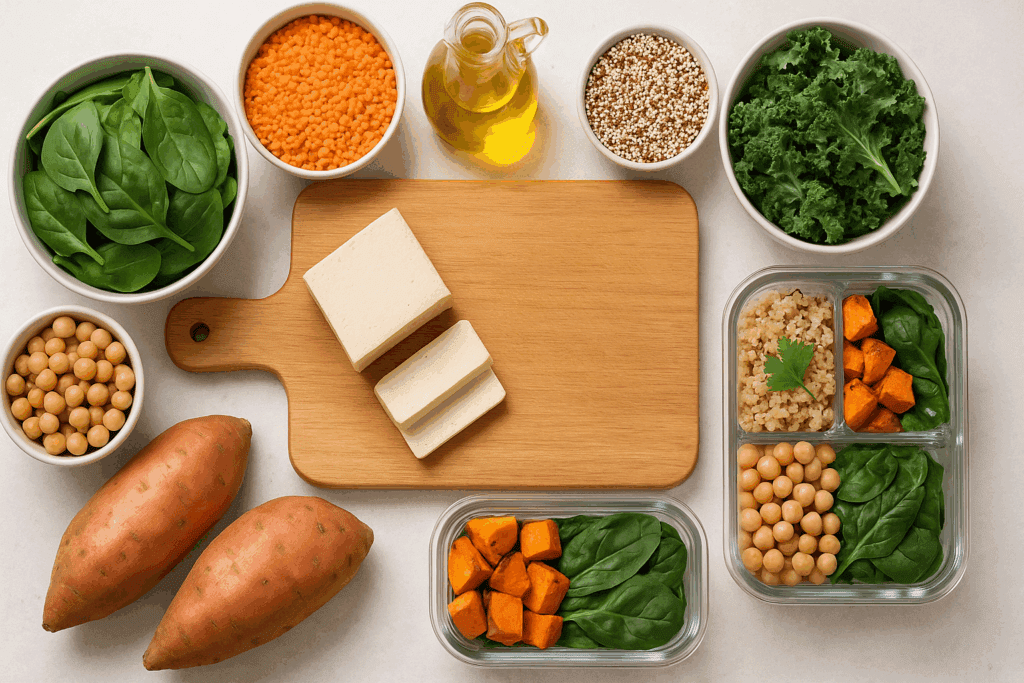
Mediterranean Chickpea Salad with Lemon-Tahini Dressing
This refreshing salad embodies the principles of mindful eating and balanced nutrition. Chickpeas, a staple in many vegetarian meals for weight loss, are rich in plant-based protein and fiber, making them an ideal foundation for a satisfying meal. Combined with cucumber, cherry tomatoes, red onion, parsley, and Kalamata olives, this dish is bursting with Mediterranean flavor and healthful antioxidants. The lemon-tahini dressing, made from tahini, lemon juice, garlic, and a touch of olive oil, adds a creamy texture and rich taste without relying on unhealthy fats.
Beyond its flavor profile, this meal provides a potent combination of macronutrients that regulate blood sugar and prevent energy crashes. The chickpeas provide a low-glycemic carbohydrate source, while the tahini contributes healthy fats that support hormone balance and brain health. Fiber from the vegetables enhances satiety, helping reduce the likelihood of overeating. This dish can be prepped in advance, making it a go-to option for busy days when you want to stay aligned with your weight loss goals.
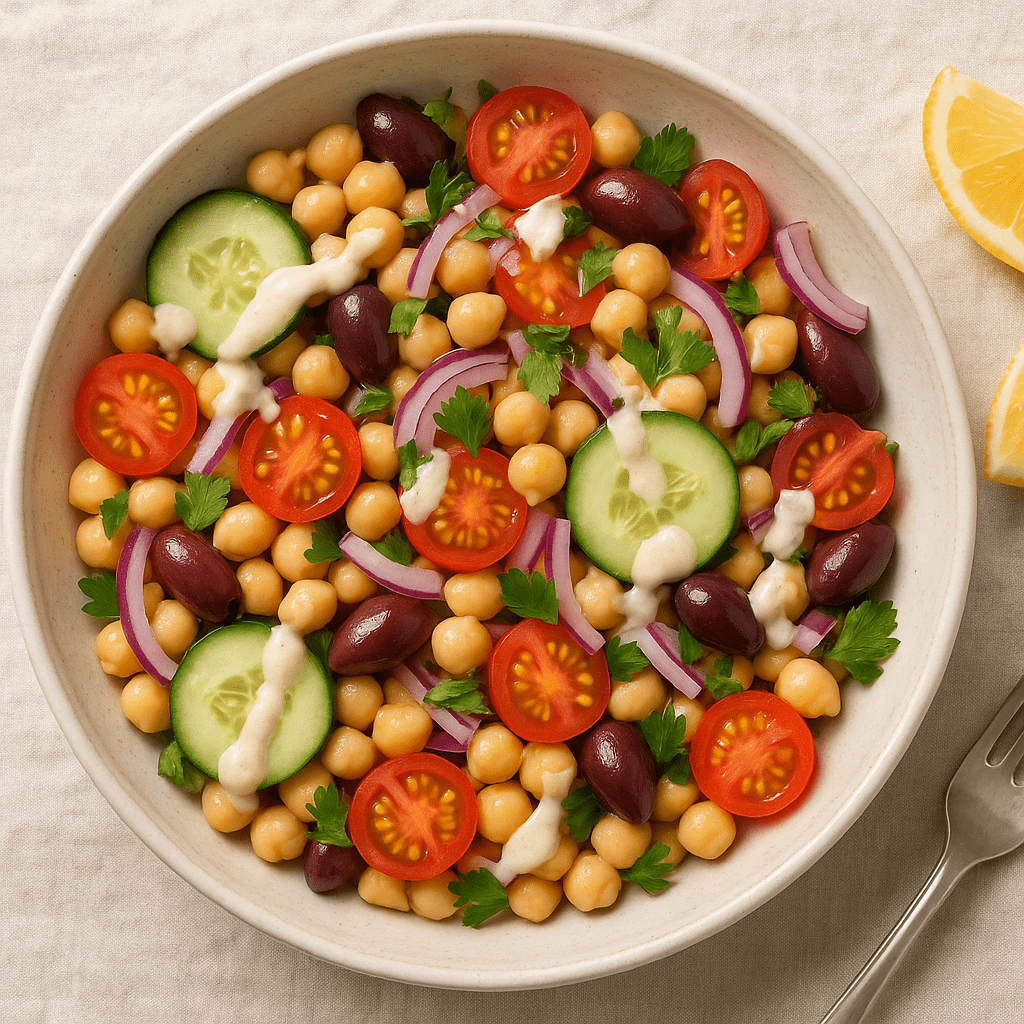
Spaghetti Squash with Roasted Vegetable Marinara
For those craving comfort food without compromising health, spaghetti squash is a versatile substitute for traditional pasta. Low in calories but high in fiber and vitamin A, this vegetable serves as an excellent base for hearty sauces. Topping it with a homemade roasted vegetable marinara elevates the dish nutritionally and flavor-wise. Roasting tomatoes, zucchini, bell peppers, and garlic concentrates their natural sweetness while retaining their antioxidant content.
This meal is a textbook example of healthy veggie meals to lose weight. It satisfies comfort food cravings while promoting metabolic health. The absence of refined carbohydrates keeps blood sugar levels stable, while the ample fiber supports digestive health and satiety. Additionally, the antioxidant-rich sauce helps combat oxidative stress, which has been linked to weight gain and chronic disease. It’s a perfect illustration of how a mindful reimagining of a classic dish can support a healthier lifestyle naturally.
Lentil and Sweet Potato Stew with Spinach
Lentils are a powerhouse in vegetarian recipes for weight loss, offering a rich source of protein, iron, and folate. When combined with sweet potatoes and spinach in a hearty stew, they create a meal that is both deeply nourishing and satisfying. Sweet potatoes provide complex carbohydrates that offer steady energy, while spinach contributes magnesium, potassium, and other micronutrients essential for cellular function and muscle performance.
What makes this stew particularly beneficial for weight loss is its ability to satisfy hunger for extended periods. The high fiber content and warm, filling texture make it ideal for colder months or evenings when cravings might otherwise lead to unhealthy snacking. The combination of plant-based protein and low-glycemic carbohydrates helps support a balanced insulin response, which is crucial for fat metabolism. This meal exemplifies how weight loss vegetarian diet recipes can be hearty, satisfying, and profoundly health-promoting.
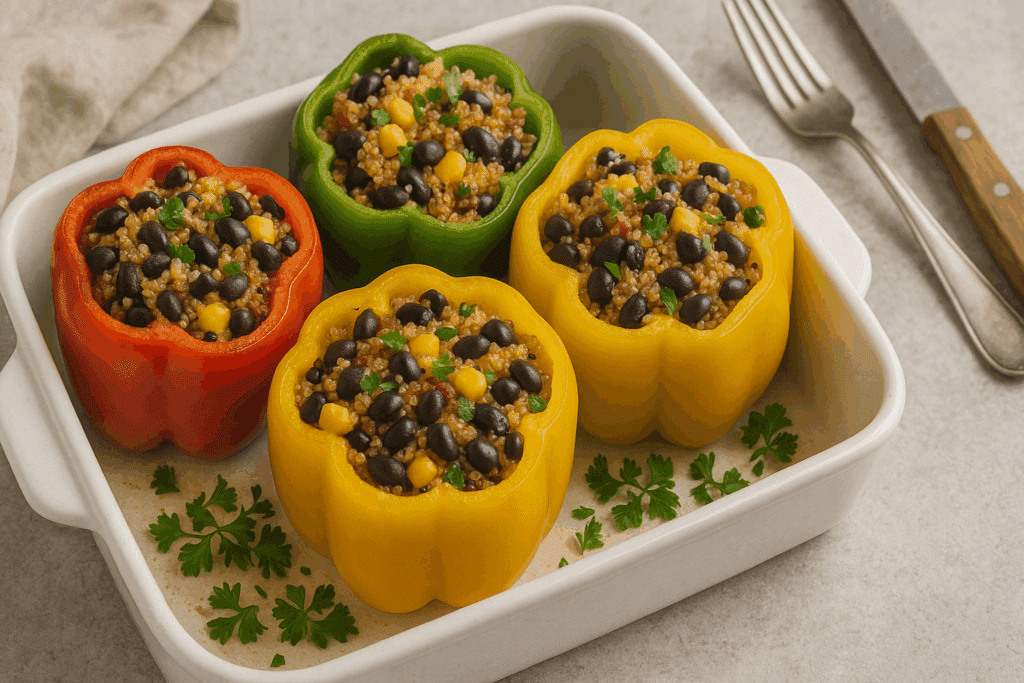
Zucchini Noodles with Avocado Pesto and Cherry Tomatoes
Zucchini noodles, often referred to as “zoodles,” offer a low-calorie alternative to traditional pasta while still providing satisfying volume and texture. When paired with a creamy avocado pesto, they become an indulgent yet health-conscious dish. Avocados supply monounsaturated fats, which have been shown to improve satiety and support cardiovascular health. Cherry tomatoes add a burst of flavor and lycopene, a powerful antioxidant associated with reduced inflammation and disease risk.
This dish showcases the creative potential of healthy veggie meals to lose weight. The zoodles mimic the texture of pasta without the blood sugar spikes associated with refined grains. The avocado pesto, rich in healthy fats and fiber, creates a feeling of fullness that supports portion control and curbs late-night snacking. It’s a vibrant, flavorful option that underscores the culinary flexibility of vegetarian cooking and its alignment with long-term wellness goals.
Stuffed Bell Peppers with Quinoa and Black Beans
Stuffed bell peppers are not only visually appealing but also nutritionally balanced. By filling them with quinoa, black beans, onions, corn, and spices, you create a complete meal that delivers plant-based protein, fiber, and essential amino acids. Quinoa, one of the few plant sources that contain all nine essential amino acids, is especially valued in vegetarian meals for weight loss due to its satiating qualities.
These stuffed peppers support healthy weight management by offering bulk and satiety without excessive calories. The fiber from the beans and vegetables slows digestion, reducing hunger between meals. Their vibrant presentation also makes them ideal for family dinners or social gatherings, proving that vegetarian recipes for weight loss can be both delicious and festive. By embracing whole foods in colorful, flavorful forms, you can cultivate a nourishing dietary pattern that promotes vitality and satisfaction.
Cauliflower Stir-Fry with Tofu and Ginger-Garlic Sauce
Stir-fries are a staple in many global cuisines and can be easily adapted to fit a weight loss vegetarian diet. This cauliflower-based stir-fry incorporates tofu, bell peppers, snap peas, and a homemade ginger-garlic sauce that enhances flavor without excessive sodium or sugar. Tofu, a soy-based protein, offers a high-quality protein source that supports muscle preservation and thermogenesis, a process that increases calorie burning during digestion.
Cauliflower, meanwhile, is low in calories and high in water content, making it ideal for volumetric eating—a strategy that focuses on consuming larger portions of low-energy-dense foods to promote fullness. The aromatic sauce not only adds depth but also contains ginger and garlic, which have anti-inflammatory and digestive benefits. This dish is a powerful example of how vegetarian meals for weight loss can be flavorful, satisfying, and supportive of metabolic health.
Thai-Inspired Peanut Noodle Bowl with Shredded Cabbage
Drawing inspiration from Southeast Asian flavors, this noodle bowl features whole grain noodles, shredded red cabbage, carrots, scallions, and a creamy peanut-lime dressing. The cabbage and carrots add crunch, fiber, and color, while the peanut sauce provides healthy fats and a rich umami flavor. Using whole grain or legume-based noodles ensures a higher protein and fiber content than traditional white noodles.
This bowl is emblematic of weight loss vegetarian diet recipes that prioritize balanced nutrition without sacrificing taste. The fiber-rich vegetables and complex carbs help maintain blood sugar stability, while the healthy fats in the peanut dressing contribute to satiety. The lime and herbs invigorate the palate, enhancing the sensory experience of eating. Incorporating international cuisines into your meal plan can prevent dietary boredom and keep you engaged with your health journey.
Baked Eggplant with Herbed Ricotta and Marinara
Eggplant’s meaty texture makes it a popular ingredient in vegetarian cuisine, and when baked with herbed ricotta and marinara sauce, it creates a dish that feels indulgent yet aligns with your health goals. Ricotta cheese, when used in moderation, provides calcium and protein, while eggplant contributes fiber and polyphenols that support gut and heart health. Using a sugar-free marinara ensures the dish remains low in added sugars.
This meal provides a comforting alternative to heavier, cheese-laden pasta dishes. Its high fiber content supports digestive health and appetite control, while the balanced macronutrients make it a sustainable choice for regular inclusion. By using cooking methods like baking rather than frying, you reduce caloric load without sacrificing flavor. This is a prime example of how healthy veggie meals to lose weight can deliver both satiety and comfort.
Curried Lentil and Carrot Soup with Coconut Milk
Soups are inherently comforting, and when prepared with nutrient-dense ingredients like lentils, carrots, and coconut milk, they become powerful tools for weight loss. This curried version delivers a warming, aromatic profile thanks to turmeric, cumin, and coriander, all of which have anti-inflammatory properties. The coconut milk adds creaminess and healthy fats that enhance mouthfeel and absorption of fat-soluble nutrients.
Lentils again shine as a featured ingredient, offering plant-based protein and iron. Carrots provide beta-carotene and a subtle sweetness that complements the spices. This soup is easy to batch-cook and freeze, making it a convenient option for busy weekdays. It represents the practical elegance of vegetarian recipes for weight loss—rich in flavor, nutrients, and convenience.
Portobello Mushroom Burgers with Avocado and Microgreens
Portobello mushrooms are a beloved meat substitute for good reason—they provide umami, texture, and a satisfying bite. When grilled and paired with avocado, microgreens, and a whole-grain bun, they form a burger that is not only delicious but also aligned with weight management goals. The mushrooms are low in calories yet high in flavor, while the avocado and microgreens supply healthy fats, fiber, and antioxidants.
This burger challenges the notion that vegetarian meals for weight loss are bland or uninspired. It’s a gourmet experience that nourishes the body and delights the palate. Microgreens, which are young vegetable greens, offer concentrated nutrients and a delicate crunch. By making thoughtful ingredient swaps, it’s possible to recreate familiar meals in a way that supports a healthier lifestyle naturally.
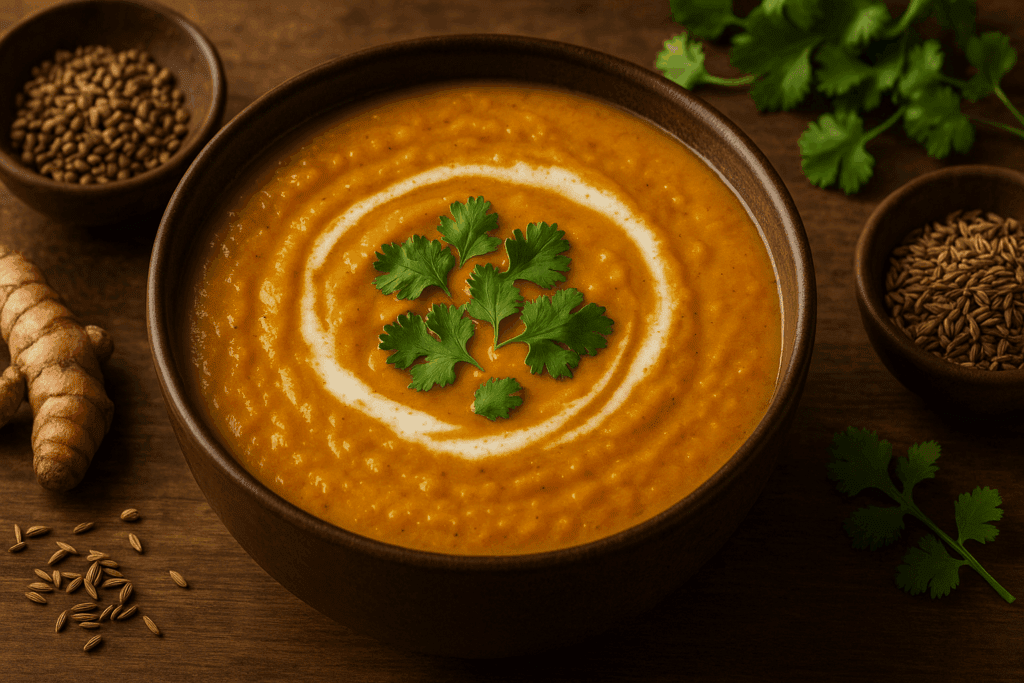
Frequently Asked Questions: Expert Insights on Vegetarian Meals for Weight Loss
What are the most common mistakes people make when following vegetarian recipes for weight loss?
Many people assume that all vegetarian meals are automatically healthy or conducive to weight loss,but this is not necessarily the case. A common mistake is relying too heavily on processed meat substitutes, which are often high in sodium, refined oils, and additives. Another frequent oversight involves underestimating portion sizes, particularly for calorie-dense ingredients like nuts, cheese, or oils. To make vegetarian recipes for weight loss truly effective, it’s important to prioritize whole foods and watch your intake of concentrated fats and sugars. Learning how to balance macronutrients—especially getting adequate protein and fiber—helps maximize satiety while minimizing cravings.
How can vegetarian meals for weight loss support hormonal balance, especially for women?
Vegetarian meals for weight loss often include phytoestrogen-rich foods like soy, flaxseeds, andlegumes, which can positively influence hormonal health, particularly in women. These natural plant compounds can help modulate estrogen levels and reduce symptoms related to hormonal fluctuations, such as those experienced during PMS or menopause. Fiber-rich plant-based diets also assist with the excretion of excess hormones, supporting endocrine balance. Moreover, reducing intake of saturated animal fats has been associated with lower levels of circulating estrogens, which can be beneficial in hormone-sensitive conditions. This demonstrates how weight-conscious vegetarian eating isn’t just about calories—it’s also a smart strategy for maintaining internal physiological harmony.
Are there ways to increase the thermogenic effect of healthy veggie meals to lose weight?
Absolutely. Incorporating thermogenic spices like cayenne, black pepper, ginger, and turmeric intoyour healthy veggie meals to lose weight can slightly boost your metabolism and increase energy expenditure. Another effective tactic is combining high-fiber vegetables with plant-based proteins, which require more energy to digest and metabolize. Eating meals at consistent times each day and avoiding late-night eating also enhances metabolic efficiency. Hydration plays a key role as well—drinking water before meals can raise resting energy expenditure temporarily. These subtle adjustments can make your vegetarian meals work harder for you in terms of fat-burning and metabolic support.
How can someone transition to weight loss vegetarian diet recipes without feeling deprived?
The key to a successful and sustainable transition is to focus on abundance rather than restriction.Instead of eliminating favorite dishes altogether, try modifying them using plant-based alternatives that preserve flavor and texture. For example, use lentils in shepherd’s pie or chickpeas in curry to replicate hearty textures. Weight loss vegetarian diet recipes can be incredibly flavorful when enhanced with herbs, citrus, and spices. Keeping meals colorful and diverse also helps stimulate appetite satisfaction. Building meals around cultural cuisines—like Indian dals or Mediterranean mezze—can infuse excitement and reduce the psychological sense of deprivation.
Can vegetarian recipes for weight loss be compatible with a high-protein diet plan?
Yes, with intentional planning, vegetarian recipes for weight loss can easily align with high-proteinnutritional strategies. Legumes, tofu, tempeh, edamame, quinoa, seitan, and Greek yogurt are all excellent protein sources that can be incorporated into diverse dishes. Combining proteins from various plant sources ensures a complete amino acid profile, supporting muscle maintenance and metabolic function. Many high-protein vegetarian recipes can be adapted into bowls, stir-fries, soups, and salads to suit different palates and meal preferences. Supplementing with protein powder derived from peas, hemp, or brown rice can also help meet increased protein needs without relying on animal products.
What role does meal timing play when using vegetarian meals for weight loss?
Meal timing can significantly influence how well your body metabolizes nutrients and manages hungercues. For those aiming to lose weight, aligning meals with circadian rhythms—eating more earlier in the day and tapering food intake toward evening—may support more effective energy utilization. Skipping breakfast or delaying meals can sometimes lead to increased hunger later in the day, making portion control more difficult. Vegetarian meals for weight loss, when consumed consistently and mindfully, help stabilize blood sugar and prevent energy dips. This rhythmic approach also reinforces intuitive eating and can support better sleep, digestion, and long-term adherence.
How do social and psychological factors affect success with weight loss vegetarian diet recipes?
Social and psychological dynamics play a substantial role in dietary success. Feeling isolated due todietary changes can undermine motivation, which is why community and support networks are crucial. Sharing meals or recipe ideas with others following similar goals helps reinforce commitment. Furthermore, the act of cooking and eating vegetarian meals mindfully can foster a positive emotional relationship with food. Choosing weight loss vegetarian diet recipes that are both nourishing and pleasurable helps counter the “diet mentality” and fosters intrinsic motivation. Emotional eating patterns often shift when individuals feel empowered and connected to their dietary choices.
What are some advanced strategies for meal prepping healthy veggie meals to lose weight?
Beyond simply batching food, strategic meal prepping can optimize both nutrition and time. Onemethod is component-based meal prep, where you prepare ingredients like grains, legumes, chopped vegetables, and dressings separately for mix-and-match flexibility. This approach prevents food fatigue and supports dietary variety. Freezing pre-portioned meals can also ensure healthy veggie meals to lose weight are readily available when time is tight. Investing in high-quality glass containers helps maintain food integrity and reduces environmental waste. Moreover, tracking macros or nutrient density during prep can help align meals more closely with individual health and fitness goals.
Are there seasonal ingredients that enhance the effectiveness of vegetarian meals for weight loss?
Yes, eating seasonally offers nutritional, economic, and metabolic advantages. In spring and summer,leafy greens, berries, cucumbers, and tomatoes are hydrating and low in calories—perfect for refreshing salads and cold soups. In fall and winter, root vegetables like carrots, turnips, and squash can be roasted or stewed for hearty, fiber-rich comfort meals. Seasonal produce often contains higher nutrient levels due to being harvested at peak ripeness, which supports overall vitality. Using seasonal ingredients in vegetarian meals for weight loss enhances flavor and reduces reliance on processed staples, improving dietary quality throughout the year.
What are some emerging trends in vegetarian weight loss nutrition to watch?
Emerging trends include the growing popularity of plant-based ketogenic and Mediterranean fusiondiets that emphasize low-carb, high-fat plant foods like avocado, nuts, and olive oil. Another promising development is the use of functional foods—such as fermented vegetables, spirulina, and adaptogenic herbs—that support gut health and hormonal balance. Personalized nutrition plans based on genetic and microbiome testing are also gaining traction, allowing individuals to tailor vegetarian recipes for weight loss to their unique biochemistry. Tech-enabled tools like AI-driven meal planning apps now help optimize meal frequency, portion sizes, and nutrient timing. These innovations are making it easier to create effective, customized strategies using weight loss vegetarian diet recipes for long-term success.

Embracing a Plant-Based Lifestyle for Long-Term Wellness
The journey toward sustainable weight loss and improved health does not require deprivation or monotony. As this article illustrates, there is an abundance of vegetarian meals for weight loss that are both delicious and deeply nourishing. Each dish embodies the principles of a mindful, plant-based diet—rich in fiber, antioxidants, healthy fats, and complete proteins—that fosters satiety, supports metabolic health, and enhances quality of life. When thoughtfully prepared and enjoyed with intention, these meals can empower individuals to achieve their wellness goals naturally and joyfully.
Incorporating a variety of vegetarian recipes for weight loss into your weekly routine not only helps manage body weight but also reinforces broader health benefits such as improved digestion, better cardiovascular function, and reduced inflammation. These meals are more than just fuel—they are expressions of care, creativity, and commitment to a healthier lifestyle. From zesty zoodles to hearty stews, the possibilities are both diverse and delicious.
Ultimately, the key to success lies in consistency and enjoyment. Choosing meals that are satisfying and flavorful makes it easier to stick to your health goals long-term. Whether you’re just beginning your plant-based journey or looking to refine an existing approach, embracing weight loss vegetarian diet recipes provides a rewarding and effective strategy for lasting wellness. The transformative power of healthy veggie meals to lose weight lies in their ability to nourish the body and spirit alike, guiding you toward a more vibrant, energized life—one meal at a time.
Further Reading:
Vegetarian meals for weight loss?

